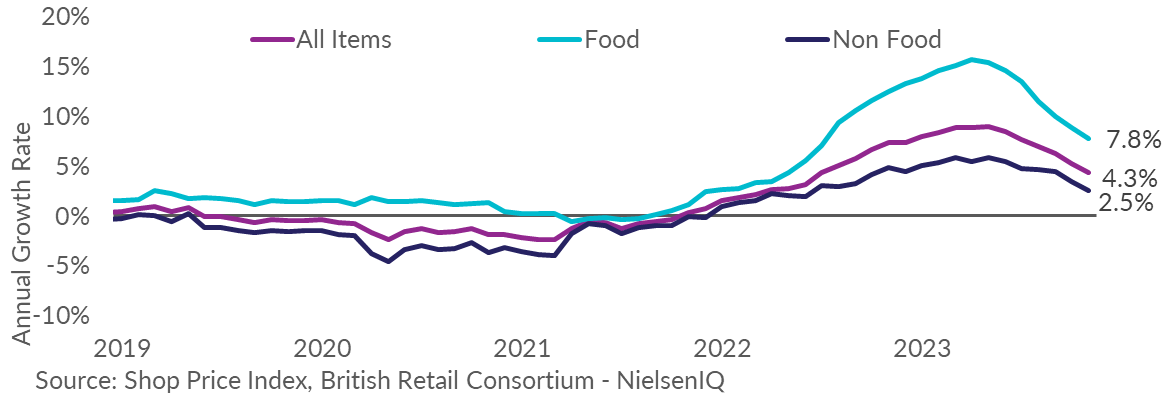Period Covered: 01 – 07
November 2023
- Shop Price annual inflation decelerated further to 4.3% in
November, down from 5.2% in October. This is below the 3-month
average rate of 5.3%. Shop price growth is at its lowest since
June 2022.
- Non-Food inflation fell to 2.5% in November, down from 3.4%
in October. This is below the 3-month average rate of 3.5%.
Inflation is its lowest since June 2022.
- Food inflation decelerated to 7.8% in November, down
from 8.8% in October. This is below the 3-month average rate of
8.9% and is the seventh consecutive deceleration in the food
category. Inflation is its lowest since July 2022.
- Fresh Food inflation slowed further in November, to 6.7%,
down from 8.3% in October. This is below the 3-month average rate
of 8.3%. Inflation is at its lowest since June 2022.
- Ambient Food inflation decelerated to 9.2% in November, down
from 9.5% in October. This is below the 3-month average rate of
9.7% and is the lowest since October 2022.
|
|
OVERALL SPI
|
FOOD
|
NON-FOOD
|
|
% Change
|
On last year
|
On last month
|
On last year
|
On last month
|
On last year
|
On last month
|
|
Nov-23
|
4.3
|
0.0
|
7.8
|
0.3
|
2.5
|
-0.1
|
|
Oct-23
|
5.2
|
0.3
|
8.8
|
0.4
|
3.4
|
0.2
|
Note: Month-on-month % change refers to changes in the
level of prices.

Helen Dickinson, Chief Executive of the British Retail
Consortium, said:
“Shop price inflation eased for the sixth month
in a row as retailers compete fiercely to bring prices down for
customers ahead of Christmas. Food inflation eased, thanks to
lower domestic energy prices reducing overall input costs,
particularly for dairy products. Ambient food inflation slowed
but remained higher than fresh food due to a larger proportion of
goods being imported to the UK and impacted by the weak pound.
While health and beauty products saw price cuts as retailers rush
to shift stock Christmas, clothing prices increased as some
retailers continued to hold off on promotional activity.”
“Retailers are committed to delivering an affordable Christmas
for their customers. They face new headwinds in 2024 - from
government-imposed increases in business rates bills to the
hidden costs of complying with new regulations. Combining these
with the biggest rise to the National Living Wage on record will
likely stall or even reverse progress made thus far on bringing
down inflation, particularly in food.”
